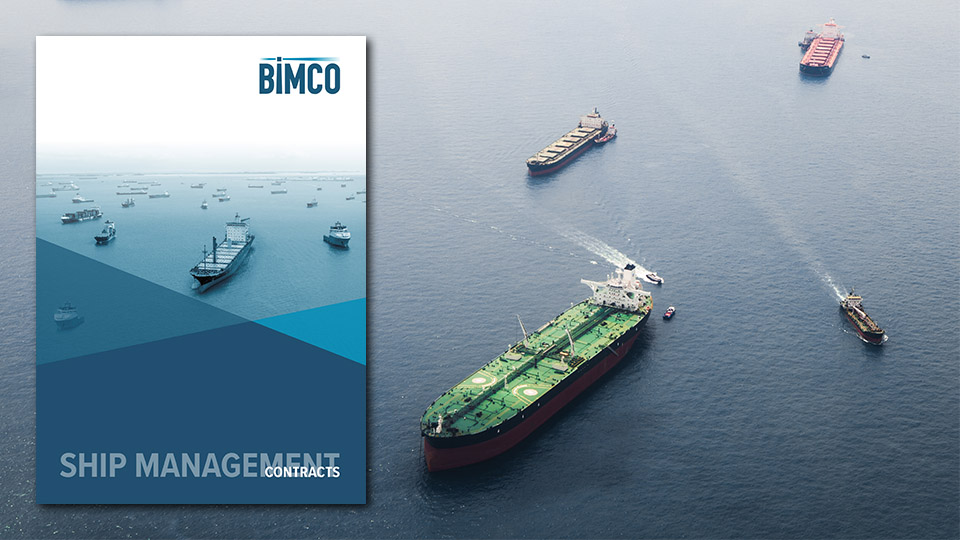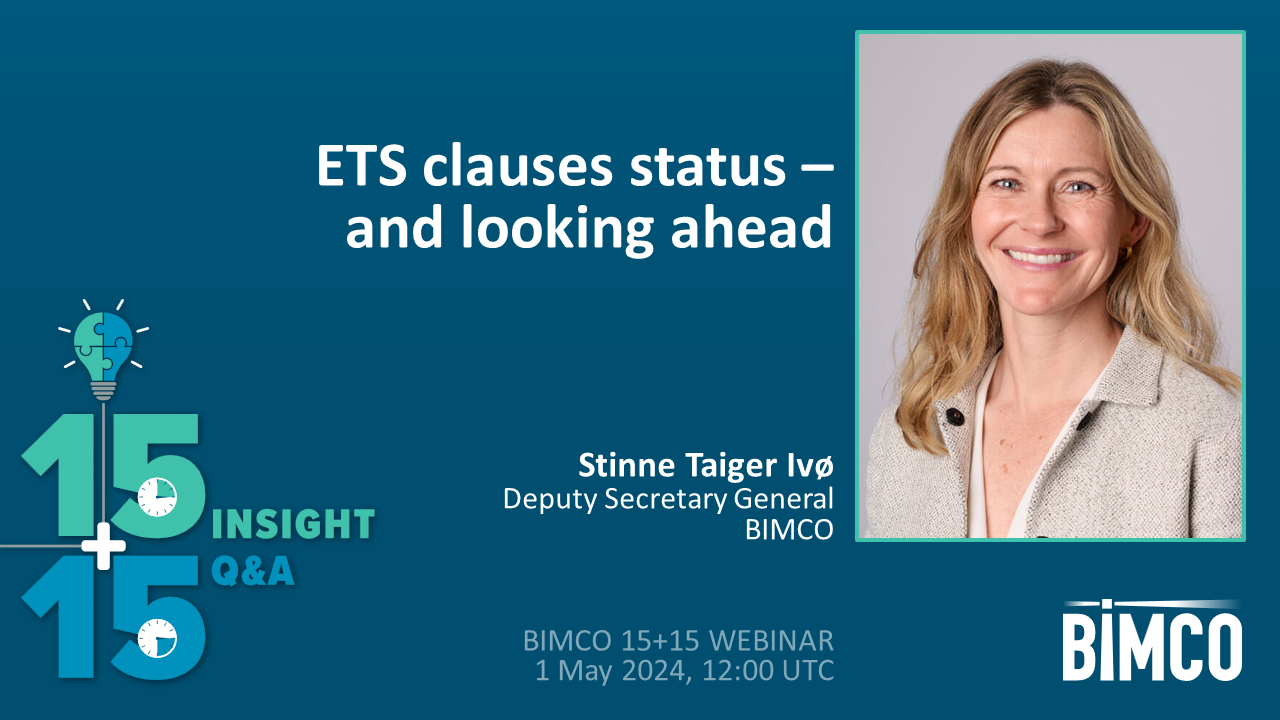Shipmanagers' Letter of Undertaking
Overview
The Shipmanagers’ Letter of Undertaking (LoU) is a model letter for use in third party arrangements where shipmanagers maintain and operate the vessel but have no financial involvement or interest in its ownership. The content of the LoU is based on provisions commonly found in market documentation but creates a more equitable starting point for discussions. The BIMCO LoU aims to eliminate the need for often protracted party negotiations where points argued in previous cases are frequently repeated, which can be time-consuming and adds to costs.
Copyright in Shipmanagers’ Letter of Undertaking is held by BIMCO.
Shipmanagers' Letter of Undertaking
Supporting documents
-
0.2 MB
Sample copy of Shipmanagers’ Letter of Undertaking
Download now
Explanatory notes
Introduction
Shipmanagers acting for an owner raising finance with the managed vessel serving as collateral are regularly required to provide the lending bank, financial institution or other commercial entity with a Letter of Undertaking (LoU). The purpose of the LoU is to put the lender in the same position it would be under the loan documents without the involvement of the third party shipmanagers; however, the contents of LoUs being required from shipmanagers are often problematic. Shipmanagers, even where they are unaffiliated third parties with no links to the shipowners, may nevertheless be required to sign documents with unreasonable and one-sided conditions that impose obligations on them beyond those contemplated, agreed and contracted to by shipmanagers under their agreement with shipowners.
Lenders’ requirements can have far-reaching implications. By way of example, a notice of assignment of insurances demanded by lenders may result in a charge being placed over the shipmanagement company leading to denial of finance for their other business operations.
In response to calls for more balanced and efficient arrangements together with uniform provisions, a model LoU has been drafted by a specialist Subcommittee. BIMCO is grateful to the following members for their participation in the project:
- Captain Ajay Hazari, Anglo Eastern (Chairperson)
- Mr Andreas Andreou, Columbia Shipmanagement
- Mr Luca Cappotto, d’Amico
- Mr Mark Brattman, ITIC
- Ms Beatrice Russ, Ince & Co
Guiding principles and content of the LoU
The model LoU is for use in third party arrangements where shipmanagers maintain and operate the vessel but have no financial involvement or interest in its ownership. The content has been based on provisions commonly found in market documentation but addresses industry concerns about the imposition of onerous provisions on third-party shipmanagers. As well as creating a more equitable starting point for discussions, the BIMCO LoU eliminates the need for often protracted party negotiations where points argued in previous cases are frequently repeated. This is time-consuming and adds to costs.
Attention is drawn to the following provisions:
Paragraph 1 (Background)
The shipmanagers are not party to the borrowing arrangements, hence the loan provisions are identified by reference (without substantive detail) as “certain financing arrangements” and noted by the shipmanagers with their acknowledgement that the LoU is a condition of the loan agreement.
Paragraph 2 (Definitions)
This sets out the meaning of commonly-used provisions including:
Management Agreement: a copy is to be attached at Annex 1;
Earnings: encompassing income from freight, hire and passenger tickets, insurance monies and the vessel’s proportion of any pooling arrangements; and
Permitted Credit: shipmanagers’ expenditure for running costs will always vary from month to month. In order to ensure the availability of adequate funds to cover all payments and meet obligations as they fall due, “permitted credit” must be set at a realistic level. A typical figure of US$750,000, applicable to conventional ocean-going vessels, has been inserted but it is open to parties to agree an appropriate amount on a case by case basis according to their needs.
Paragraph 3 (Appointment)
The shipmanagers’ appointment is in accordance with the terms of the management agreement. Since shipmanagers’ role might include functions such as crew and commercial management, the all-embracing term “manager” has been used in place of the more restrictive “technical manager”.
Paragraph 4 (Undertakings)
Subparagraph (a) save for any provisions permitting shipmanagers to terminate the management agreement, the content may be changed only with the lenders’ consent which shall not be unreasonably withheld;
Subparagraph (b) in the event of shipowners’ default on their payment obligations, lenders must be given at least fifteen days’ notice of shipmanagers’ intention to terminate the management agreement;
Subparagraph(c) prohibits shipmanagers from extending any credit arrangements beyond the agreed permitted credit;
Subparagraph (d) other than in respect of claims within the limit of permitted credit, lenders have first call on sums and payments due to or against the shipowners or the vessel;
Subparagraphs (e) to (h) impose restrictions, other than in relation to permitted credit, on shipmanagers’ rights of recovery in the event of claims, requisition or the shipowners’ bankruptcy;
Subparagraph (i) provides that requests for shipmanagers to produce documentation must not be excessive while such information must be reasonably accessible and not in breach of legislative provisions or confidentiality obligations; and
Subparagraph (k) if the loan is “called-in” by the lenders, shipmanagers will terminate the management agreement with immediate effect, subject to any prior accrued rights.
Note: there is no waiver of any right to require lenders to proceed against other parties before taking enforcement action against shipmanagers.
Paragraph 5 (Insurance)
As a disinterested party, shipmanagers’ ability to raise finance for their other operations must not be prejudiced by lenders demanding assignments which may create a charge over the shipmanagement company. In place of the problematic implications of demands for shipmanagers to assign any rights under insurance policies, lenders’ interests are to be set out in a Loss Payable clause. The wording, which is for agreement on a case by case basis between lenders, shipowners and their insurers, is to be set out and inserted at Annex 2.
Paragraph 7 (Termination)
In order to protect shipmanagers from open-ended liabilities, their obligations under the LoU are time-limited and cease on discharge of the loan by the shipowners (or on termination of the management agreement).
Paragraph 8 (Governing Law and Jurisdiction)
The alternative wording in paragraph 8.2 allowing for the parties to insert a "Governing Law and Jurisdiction" clause other than English law under paragraph 8.1, should be used with caution. The form of the LoU was prepared using the principles of English law as a basis and, in particular, the provisions of paragraph 4 concerning undertakings given by the manager and paragraph 5 insurances, might not operate as intended in other jurisdictions. Subordination is a complex legal concept and some legal systems might not allow certain of these undertakings to take effect and might supplement the provisions with their own rules of law. If the parties wish to settle on a non-English Governing Law and Jurisdiction, they are strongly recommended to seek independent legal advice in the relevant jurisdiction prior to entering into such letter of undertaking.
Signature
The absence of assignment provisions means that the letter does not have to be executed as a deed.
Annex 1
This is for insertion of the Management Agreement.
Annex 2
This is for insertion of the loss payable clause (see paragraph 5) agreed between the parties.
Related Help & Advice
Create or edit a contract
The one-stop digital shop for all the standard maritime contracts and clauses you’ll ever need.
Latest Related News
-
BIMCO publishes ship financing forms to ensure uninterrupted use of ships
BIMCO has published two standard Quiet Enjoyment Letters (QELs), the first standard form QELs available to the industry, to offer a tool that can ensure the charterers’ uninterrupted use of a ship if the owner defaults under the financing facility.
-
BIMCO starts work on contract for growing wind turbine market
BIMCO has established a subcommittee to work on a global standard contract for the transport and installation of offshore wind turbines. The project has been launched to support the offshore wind industry as the global demand for more renewable sources of energy increases.
-
BIMCO SmartCon information and available contracts
There is a new version of BIMCO SmartCon and it combines the fast, simple and easy approach from the online version, together with the track changes and comments from Word. The editor is online and you don't need to install anything, the only requirement is that you have the latest version of a modern browser like Google Chrome and Microsoft Edge.
-
SmartCon terms of use
Version 6.0, Date: 1 November 2023.
ELSEWHERE ON BIMCO
Holiday calendar
BIMCO's Holiday Calendar covers general holidays in over 150 countries, plus local holidays and working hours in more than 680 ports around the world.
Taxes, tariffs & charges
Access information on national, regional or port tariffs, taxes and charges.
Learn about your cargo
For general guidance and information on cargo-related queries.





